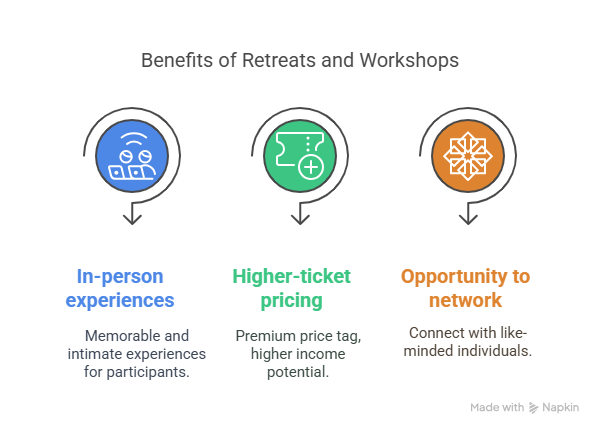Career Opportunities After Holistic Life Coach Certification
Becoming a holistic life coach is a powerful decision for those passionate about helping individuals live their best lives. With the rise in demand for personal development and well-being, obtaining a holistic life coach certification offers a variety of career opportunities. Whether you're seeking to start a private practice, lead group coaching sessions, or work within corporate wellness programs, there are multiple career paths to explore. This guide will delve into the various career opportunities for certified holistic life coaches, how your certification impacts job prospects, expected income ranges, and essential tools to help you succeed in building your coaching business.
Understanding the Holistic Life Coach Certification
A holistic life coach certification equips you with the necessary skills to support clients in improving their physical, mental, and emotional well-being. Holistic coaching takes a whole-person approach, addressing the mind, body, and spirit, making it a popular choice for those seeking deeper, more balanced transformations. A certification, especially from an ICF-accredited program, can enhance your credibility and open doors to a wide range of career opportunities. But what career paths are available, and how does the certification affect your success?
Career Paths After Holistic Life Coach Certification
1. Private Practice
Starting a private practice as a holistic life coach is one of the most popular career paths. It offers the freedom to work with clients on a one-on-one basis and create personalized coaching programs. Many coaches find this route fulfilling because it allows them to develop deep connections with their clients and witness their transformations.
How to get started:
Develop a niche: Specializing in a particular area like stress management, life transitions, or personal growth can help attract your ideal client base.
Create a professional brand: Building an online presence through a website and social media is crucial to reaching potential clients. Highlight your qualifications, coaching style, and success stories.
Client referrals: Word-of-mouth referrals are essential in private practice. Building strong relationships with your clients will help generate organic growth.
2. Group Coaching
Group coaching is an excellent option for holistic coaches who enjoy working with multiple people at once. It allows you to expand your impact and reach a larger audience while still providing individualized attention within the group setting. Group coaching can be done in person or virtually, making it a versatile option for any coach.
Benefits of group coaching:
Scalable income: By working with multiple clients at once, you can increase your earning potential.
Sense of community: Clients benefit from connecting with others who are on similar journeys, which can be motivating and empowering.
Cost-effective: Group coaching tends to be more affordable for clients compared to private coaching, making it accessible to a wider audience.
3. Corporate Wellness Programs
With the growing awareness of mental health and well-being in the workplace, many companies are incorporating wellness programs into their employee benefits. As a certified holistic life coach, you can offer services like stress management workshops, leadership coaching, and work-life balance strategies.
How corporate wellness benefits both the coach and the company:
Steady income stream: Corporations often have larger budgets for wellness programs, providing a stable income for coaches.
Broader reach: You get the opportunity to work with diverse professionals, expanding your influence and network.
Job satisfaction: Helping employees thrive in both their professional and personal lives is highly rewarding.
Related Blog: What to look for in the Best Holistic Life Coach Certification Program.
4. Retreats and Workshops
Holistic life coaches can also host retreats or workshops, offering immersive experiences for clients looking to make significant life changes. These events often combine elements of yoga, mindfulness, meditation, and life coaching to facilitate deep transformation in a supportive environment.
Retreats and workshops offer:
In-person experiences: You can create a memorable and intimate experience for participants.
Higher-ticket pricing: These types of programs tend to have a premium price tag, which can lead to higher income potential.
Opportunity to network: Hosting events allows you to connect with like-minded individuals and expand your client base.
How Certification Affects Job Prospects
Holding a holistic life coach certification, especially one from an ICF-accredited program, significantly boosts your credibility and opens more doors for career opportunities. Many clients, especially those seeking professional coaching, look for coaches who have undergone rigorous training and adhere to established coaching standards. This certification demonstrates your competence, ethics, and commitment to delivering quality coaching services.
The Importance of ICF Accreditation
The International Coach Federation (ICF) is a global leader in setting high standards for coaching. Being certified by ICF not only enhances your professional reputation but also provides you with access to a network of qualified coaches and potential clients. In many cases, clients may specifically seek out coaches who are ICF-accredited because of the rigor of their training. Before choosing your career path, it's essential to understand the difference between accredited or non-accredited holistic life coach certifications, as this can significantly impact your job prospects and credibility as a coach.
Expanded Opportunities
When you have a certification from a reputable organization, you increase your chances of being hired for corporate coaching positions, facilitating workshops, or becoming a sought-after coach in specialized fields like executive coaching or health and wellness. Moreover, many companies that offer coaching services to employees will only partner with certified coaches, making your certification essential to securing corporate contracts.
Expected Income Ranges and Variables
As with any career, income as a holistic life coach varies depending on several factors, such as location, niche, and clientele. Here are some general income expectations:
Income Expectations for Different Career Paths:
Private Practice: Coaches in private practice typically charge between $75 to $300 per hour, with higher-end coaches earning significantly more depending on their experience and niche.
Group Coaching: Group coaching fees range from $50 to $200 per participant, depending on the length of the program and the coach's experience.
Corporate Wellness: Corporate coaches can charge anywhere from $1,000 to $10,000 per contract, depending on the size of the company and the scope of services offered.
Retreats: Hosting retreats can be lucrative, with coaches charging anywhere from $500 to $5,000 per participant for multi-day events.
Variables that Impact Income:
Location: Coaches in metropolitan areas or regions with higher living costs may charge more than those in rural areas.
Niche: Specialized coaches (e.g., executive coaches, health and wellness coaches) can command higher fees.
Audience: Coaches with an established following or a robust online presence can often charge premium rates.
Experience: More experienced coaches tend to earn more due to their reputation and proven results.
Tools and Platforms to Build a Coaching Business
Building a successful coaching business requires the right tools and platforms. Here are a few essential resources to help you get started:
1. Website and Branding: A professional website that clearly showcases your services, expertise, and client testimonials is essential. Use platforms like Squarespace, Wix, or WordPress to build a visually appealing site.
2. Online Scheduling Tools: Tools like Calendly or Acuity Scheduling help clients book appointments easily, saving you time and ensuring a smooth client experience.
3. Client Management Platforms: Software like CoachAccountable or Practice Better can help you track client progress, manage appointments, and store important documents.
4. Marketing and Social Media: To reach potential clients, you’ll need to use platforms like Instagram, LinkedIn, and Facebook to share your expertise, testimonials, and offers. Running paid ads on these platforms can also help grow your business.
5. Email Marketing: Tools like Mailchimp or ConvertKit can help you build an email list and nurture leads, turning them into paying clients.
Related Blog: How to Become a Holistic Life Coach: A Step-by-Step Roadmap
How to Attract and Retain Clients
Attracting and retaining clients is critical to the success of your coaching business. Here are a few strategies to keep in mind:
1. Content Marketing: Create valuable content that speaks to your ideal clients’ pain points and provides solutions. Blog posts, podcasts, videos, and webinars can all be effective tools for attracting attention.
2. Offer Free Resources: Provide free resources like downloadable guides or mini-courses to showcase your expertise and build trust with potential clients.
3. Client Testimonials: Social proof is one of the most powerful ways to attract new clients. Ask satisfied clients for testimonials and showcase them on your website and social media.
4. Referral Programs: Encourage existing clients to refer friends and family by offering discounts or free sessions in return.
5. Follow-Up: After working with clients, continue to stay in touch with them. Offering additional services, sending updates, and maintaining a strong relationship can encourage repeat business and referrals.
10 Lesser-Known Facts About Career Opportunities
Specialization in Niche Markets: Holistic coaches can specialize in niche areas like nutrition coaching, spiritual healing, or mindfulness for athletes, offering tailored services to targeted audiences.
Growing Global Demand: The coaching industry is expanding globally, with rising demand in Asia-Pacific, Latin America, and the Middle East, opening up international career opportunities.
Lucrative Corporate Coaching: Holistic coaches in corporate wellness programs can charge premium rates for services like stress management, leadership development, and employee well-being.
Profitable Retreats and Wellness Tourism: Wellness retreats are a growing industry. Coaches can create luxury retreats that offer substantial revenue due to the increasing demand for wellness tourism.
Incorporating Technology: Coaches can leverage online platforms, mobile apps, and AI-powered tools to offer remote services, scaling their business to reach global clients.
Publishing Opportunities: Certification can open doors for coaches to publish books, contribute to wellness blogs, or create online courses, generating passive income and building their brand.
Flexibility of Group Coaching: Group coaching allows coaches to work with multiple clients at once, providing affordable services while maintaining higher income potential.
Complementary Certifications: Holistic coaches can pursue additional certifications in areas like yoga, nutrition, or hypnotherapy to offer a broader range of services and attract more clients.
Coaching for Children and Families: Coaches can work with children, families, and parents, offering specialized services like family counseling and childhood trauma recovery.
Ongoing Membership Programs: Holistic life coaches can establish membership programs where clients pay a subscription fee for continuous support, exclusive content, and group sessions, ensuring consistent income.
Conclusion
A holistic life coach certification can open up a world of career opportunities, from private practice to corporate wellness and beyond. With the right tools, platforms, and marketing strategies, you can build a thriving coaching business that helps others achieve holistic transformation. Whether you're just starting out or looking to expand your offerings, the possibilities are endless for those who are passionate about personal development and making a positive impact on the world.
ANHCo is a trusted name in holistic coaching, dedicated to empowering individuals with the skills to transform lives through a mind-body-soul approach. The ANHCO Life Coach Certification is designed to help aspiring coaches master core techniques, develop a deeper understanding of human behavior, and create meaningful client transformations. Backed by a supportive community and practical tools, this certification opens doors to private practice, retreats, corporate wellness, and more. Whether you're starting fresh or expanding your current practice, ANHCo prepares you for long-term success in the coaching industry. Ready to begin your journey? Explore the ANHCo Life Coach Certification Course now!
FAQS
-
Certified holistic life coaches can work in private practice, group coaching, corporate wellness programs, health retreats, and online coaching platforms. The field also allows for specialization in niches like spiritual coaching, wellness, or personal development.
-
While not mandatory, an ICF-accredited certification significantly enhances credibility and trust. Many clients and employers prefer certified coaches, especially for corporate and international roles, making it easier to secure high-paying opportunities.
-
Yes, many holistic life coaches run fully virtual practices. With tools like Zoom, Calendly, and coaching platforms, you can serve clients globally and operate a location-independent business.
-
Income varies based on niche, experience, location, and services offered. On average, holistic life coaches can earn between $40,000 to $100,000+ annually, with top earners bringing in significantly more through retreats, programs, or corporate contracts.
-
No prior degree is required. A comprehensive certification program equips you with the skills needed to start coaching. However, having experience or interest in wellness, mindfulness, or counseling can enhance your coaching style.
-
You can attract clients through social media, a personal website, workshops, networking, and referral programs. Building a brand, offering free discovery sessions, and joining coaching directories also helps increase visibility and trust.





